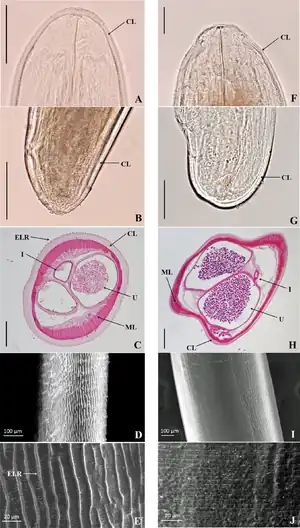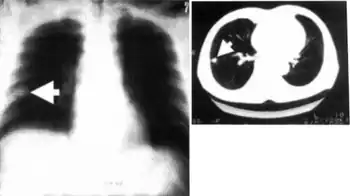Dirofilariasis
| Dirofilariasis | |
|---|---|
 | |
| Comparison of probable Dirofilaria repens (left) and Dirofilaria immitis (right) | |
| Specialty | Infectious disease |
Dirofilariasis is an infection by parasites of the genus Dirofilaria.[1] It is transmitted through a mosquito bite; its main hosts include dogs and wild canids. These can give rise to granulomas in the pulmonary artery. Some common symptoms include cough, fever and pleural effusion. It may also appear on X-rays of the chest.[2]
Signs and symptoms
The clinical presentation of Dirofilariasis is based on the presence of nodules that are tender[3]
Causes
It can be caused by:
- Dirofilaria immitis
- Dirofilaria repens
- Dirofilaria tenuis
Diagnosis

Dirofilariasis is often diagnosed by the examination of tissue obtained as part of the diagnostic investigation of coin lesions. Blood tests are not yet helpful in the diagnosis of dirofilariasis in humans.[4]
Treatment
Treatment with tetracycline antibiotics has been reported to damage Dirofilaria immitis, often causing death of adult worms.[5]
References
- ↑ "Dirofilariasis: Practice Essentials, Background, Pathophysiology". 2017-02-09. Archived from the original on 2022-08-30. Retrieved 2022-05-08.
{{cite journal}}: Cite journal requires|journal=(help) - ↑ "Dirofilariasis FAQs". Center for disease control and prevention. February 8, 2012. Archived from the original on October 13, 2021. Retrieved May 16, 2019.
- ↑ "CDC - DPDx - Dirofilariasis". www.cdc.gov. 27 June 2019. Archived from the original on 2 October 2022. Retrieved 30 January 2023.
- ↑ Prevention, CDC - Centers for Disease Control and. "CDC - Dirofliariasis - Frequently Asked Questions (FAQs)". www.cdc.gov. Archived from the original on 2021-10-13. Retrieved 2017-10-08.
- ↑ Kramer, L.; Grandi, G.; Leoni, M.; Passeri, B.; McCall, J.; Genchi, C.; Mortarino, M.; Bazzocchi, C. (2008-12-10). "Wolbachia and its influence on the pathology and immunology of Dirofilaria immitis infection". Veterinary Parasitology. 158 (3): 191–195. doi:10.1016/j.vetpar.2008.09.014. ISSN 0304-4017. PMID 18947926.
External links
| Classification | |
|---|---|
| External resources |
|